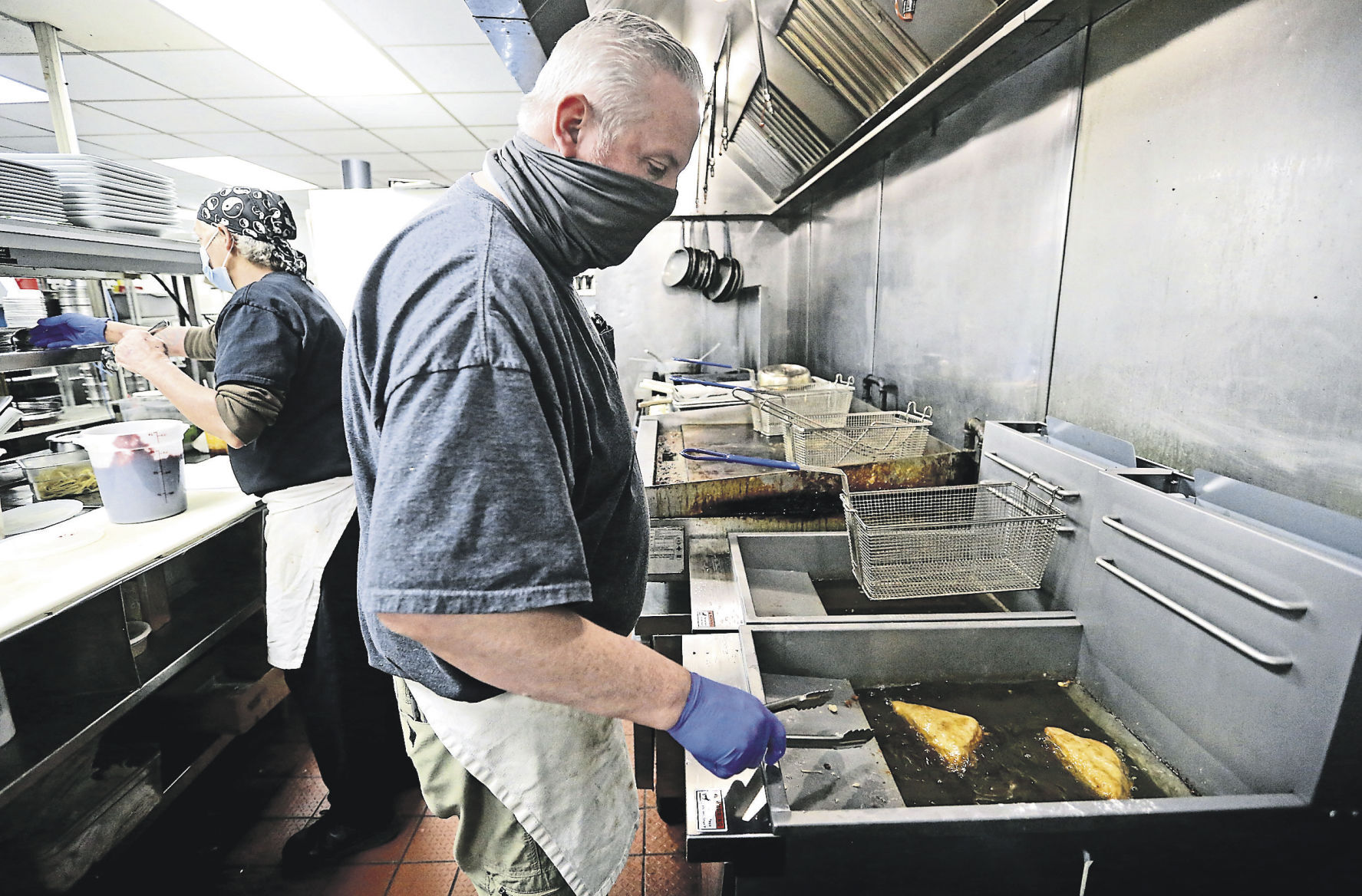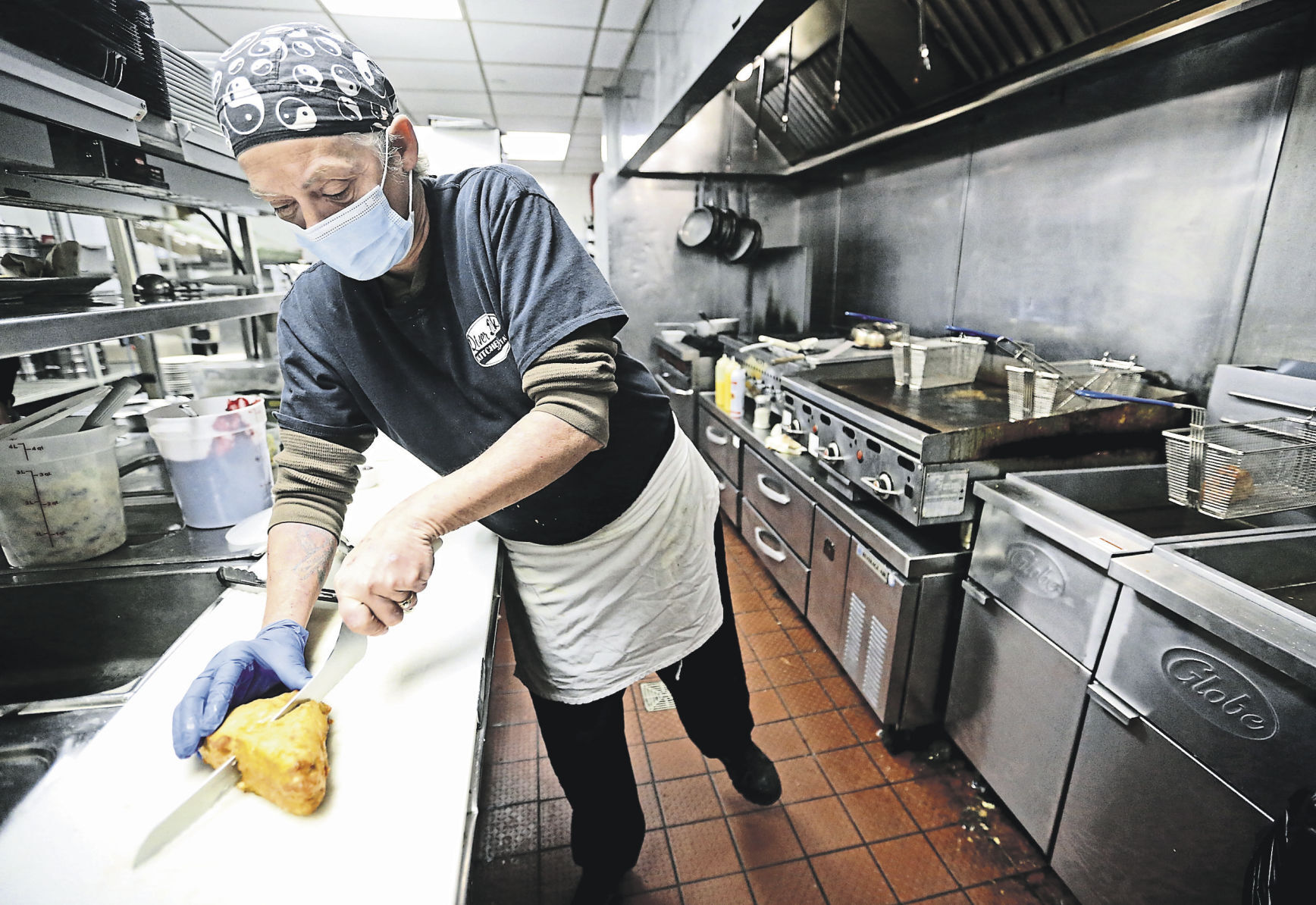Not so long ago, Elliot Rhoad would not have imagined that a ghost kitchen could find a home in a city such as Dubuque.
“I knew it was a concept in the restaurant world, but I equated it to big city markets like San Diego, San Francisco, Los Angeles, New York City,” he said.
Now Rhoad, the general manager at the Holiday Inn in downtown Dubuque, 450 Main St., works closely with one of two thriving ghost kitchens that have recently opened in Dubuque.
Bennigan’s On the Fly, an offshoot of Irish-themed restaurant chain Bennigan’s, set up shop in the Holiday Inn in February. MrBeast Burger, a restaurant concept popularized by YouTuber MrBeast, took up residence in Red Robin, 2775 Northwest Arterial, in May.
In a ghost kitchen, employees from another restaurant prepare orders from the ghost kitchen’s menu. Orders are available for pickup or delivery through a third-party service such as GrubHub or DoorDash.
In recent years, many large restaurant chains have launched ghost kitchen brands. Chuck E. Cheese, for example, owns and operates the ghost kitchen Pasqually’s Pizza & Wings. Outback Steakhouse launched Tender Shack, Chili’s created It’s Just Wings; and Denny’s has two ghost kitchens: The Burger Den and The Melt Down.
“It makes sense because (host restaurants) already have kitchens, so the investment cost is very low,” said Shawn Finn, senior vice president of operations for Legendary Restaurants, which owns Bennigan’s and Bennigan’s on the Fly. “You’re basically just bringing in the menu items, setting up delivery (and) training the kitchen team.”
Kinseth Hospitality Companies, the management group for the Dubuque Holiday Inn, also manages several full-service Bennigan’s locations in Iowa. Finn said it was a natural extension of the companies’ partnership to introduce Bennigan’s in two Iowa hotels — one in Dubuque and the other in Coralville — through the use of ghost kitchens.
Ghost kitchens are known by many other names — virtual kitchens, cloud kitchens, delivery-only kitchens — and not everyone defines each term the same way.
Rhoad, for his part, differentiates between a ghost kitchen, where one business operates out of another dine-in restaurant’s kitchen, and a virtual kitchen, where one (or multiple) businesses cook in a kitchen with no dine-in presence. In such virtual kitchens, multiple chefs each might have their menu but work together out of the same kitchen to help cook each other’s food and save expenses.
“In some of these bigger markets, I know for example in San Francisco, where real estate is so terrible, they’ll have 10 kitchens running out of the same physical kitchen,” he said. “Not only do they pool equipment, (but) they also pool labor.”
Rhoad said he would consider both Bennigan’s on the Fly and MrBeast Burger to be ghost kitchens since they operate out of another dine-in restaurant’s kitchen.
Tabatha Schoenberger, Red Robin general manager, said she didn’t know what to expect when she learned that MrBeast Burger would set up a ghost kitchen within their restaurant.
The initial days had their ups and downs, she said, as the team balanced Red Robin and MrBeast Burger orders and navigated a “completely different cooking process” for the new menu items.
“It was something new for our kitchen,” she said. “We’re used to cooking (burgers) on a grill, and these are flat-topped patties, almost like Freddy’s, just smashed. We had the equipment — it was just getting used to using it in a different way.”
Red Robin employees learned the new cooking style via training videos through MrBeast Burger, just as Holiday Inn employees did several months earlier with Bennigan’s.
Finn said the host restaurant pays a periodic royalty fee to the ghost kitchen for such training programs and the use of their menu items. The royalties are based on the sales of Bennigan’s items from each period.
Profits from sales of ghost kitchen items go to the host restaurant, in this case, Holiday Inn. In addition to the royalty paid to the ghost kitchen, the host restaurant also negotiates a royalty with the third-party delivery services they use. Finn said the Bennigan’s corporate team does not get involved with that relationship.
Bennigan’s on the Fly in Dubuque also pays an additional licensing fee to allow Holiday Inn to sell select Bennigan’s items for dine in within the hotel’s restaurant, which Rhoad said was motivated by customer demand.
He said a ghost kitchen is ultimately profitable for the host restaurant thanks to economies of scale.
“I already have to have two cooks here a night, no matter how busy we are,” Rhoad said. “I’m already paying the staff … and I already have the equipment and the fry oil and the electricity and the lights on, so I’m really just adding the extra food cost and the royalties.”
More than a month into the MrBeast Burger partnership, Red Robin has found its rhythm, and Schoenberger hopes the ghost kitchen may help them reach a new demographic. Red Robin is traditionally known as a family restaurant, while MrBeast Burger is more popular among 14- to 20-year-olds, she said.
“If we can execute (MrBeast Burger) well, then hopefully, they will want to come to Red Robin and try our food as well,” Schoenberger said.
Both Dubuque ghost kitchens have seen steady demand since they opened. Not only does the concept give customers access to new options in the local restaurant market, but Rhoad said the COVID-19 pandemic and the need for mobile dining was a catalyst for ghost kitchens nationwide.
It’s a demand that he doesn’t think will disappear as the pandemic wanes.
“Now, people have seen the convenience of it,” he said. “Once you’ve decided that it’s just as easy to order your dinner through DoorDash than it is to go and get it yourself, then you’re willing to keep doing that, whether it’s COVID or not.”



